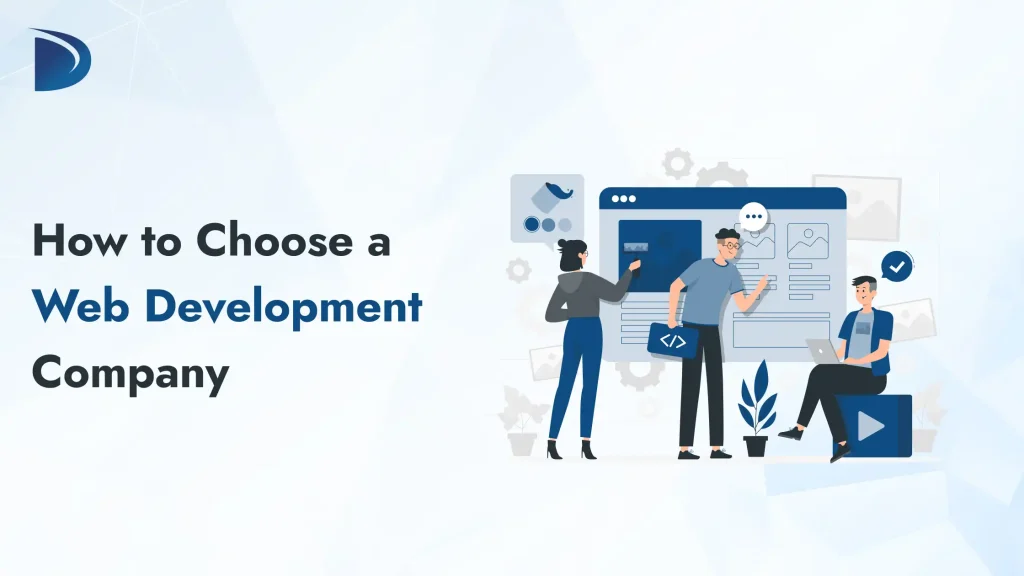Table of Contents
A website is often your first impression online. A slow, confusing, or poorly designed site can quietly drive visitors away, while a well-built site builds trust, generates leads, and supports long-term growth. That’s why choosing the right web development company is one of the most important decisions for your business.
Did you know? 88% of online visitors are less likely to return after a bad website experience.” Source: Adobe, HubSpot UX stats 2024
In this blog, we’ll discuss how to choose a web development company, why this decision is crucial, and what factors to consider before making a final decision.
Why Choosing the Right Web Development Company Matters?
Your website speaks before you do. It’s often the first place people decide if your business feels trustworthy, modern, and easy to work with. A strong site leaves a good impression. A weak one quietly pushes people away.
Site Speed: A slow or broken site turns visitors away within seconds
- “A 1-second delay in page load can reduce conversions by up to 20%.”
(Google PageSpeed Insights, 2024) - “Businesses with strong websites see up to 40% higher revenue growth compared to those with poorly designed sites.”
(Forrester Research, 2024)
Mobile: Poor mobile design frustrates most users. A confusing layout can lose potential leads before they take action.
- “Over 59% of all web traffic now comes from mobile devices.”
(Statista, Jan 2024)
SEO: A bad SEO setup keeps your site hidden from search engines
- “Top results on Google get 27% of all clicks, while page 2 results get less than 1%.”
(Backlinko SEO CTR Study 2024)
Security: Weak security puts user trust and data at risk
- “43% of cyber attacks target small businesses, often due to weak website security.”
(Verizon Data Breach Report, 2024) - “75% of users admit they judge a business’s credibility based on website design.”
(Stanford Guidelines for Web Credibility, updated 2023)
Let’s see what’s working and what’s not. Get actionable advice from our experts today.
Steps to Choose the Best Web Development Company
1. Define Your Website’s Purpose
Decide what you want your website to achieve:
- Sell products (eCommerce)
- Capture leads
- Build credibility
- Support customers
📌 Pro Tip: Websites with clear CTAs convert 200% better (WordStream, 2024).
2. List the Features You Need
Make a simple feature list before reaching out to developers:
- Signup forms
- Search & filter options
- Live chat
- Payment gateways
- Blog section
- Responsive mobile design
3. Set a Budget Range
Website costs vary widely:
| Website Type | Estimated Cost (USD) |
|---|---|
| Simple business site | $3,000 – $10,000 |
| Custom mid-sized site | $10,000 – $20,000 |
| eCommerce store | $10,000 – $50,000+ |
| Enterprise platform | $50,000+ |
On average, small business websites take 8–12 weeks to plan, build, and launch (GoodFirms, 2024).
No hidden fees, no surprises – just transparent pricing that aligns with your goals.
4. Shortlist Potential Companies
Start with trusted sources like:
- Clutch
- GoodFirms
- Google Reviews
Look for:
- Portfolios with similar work
- Consistent positive feedback
- Clear communication
5. Schedule Consultations
Book calls with shortlisted companies. Ask:
- Do they ask about your business goals?
- How do they explain their process?
- Do they suggest tailored solutions or just push packages?
6. Check Time Zone & Availability
Timely communication is critical. Confirm:
- Availability for meetings
- Average response time
- Preferred communication tools (Slack, Trello, email)
7. Review Their Process
A reliable company should outline:
- Discovery & planning
- Design & development
- Testing & revisions
- Launch & post-launch support
Agile or Scrum methods are ideal for flexibility.
8. Verify Their Tech Stack
Ask about their experience with:
- CMS (WordPress, Drupal)
- Frameworks (React, Next.js, Laravel)
- eCommerce platforms (Shopify, Magento, WooCommerce)
👉 Choose a tech stack that matches your growth plans, not just their comfort zone.
9. Confirm Deliverables & Ownership
Before signing, ensure the contract covers:
- Website ownership & source code rights
- Admin/hosting access
- SEO basics (meta tags, mobile responsiveness, site speed)
- Testing across devices & browsers
10. Clarify Post-Launch Support
Ask about:
- Bug fixes (included or extra?)
- Update cycles
- Support plans or hourly maintenance options
60% of website issues are reported in the first month post-launch (Clutch & HubSpot, 2024).
Conclusion
Choosing a web development company isn’t just about price it’s about finding a partner who understands your goals, communicates clearly, and delivers long-term value. Do your research, ask the right questions, and prioritize reliability over shortcuts.
FAQs
What should I look for in a web development company?
Experience, strong portfolio, positive reviews, technical expertise, transparent pricing, and reliable communication.
How much does it cost to hire a web development company?
- Small business site → $3,000 – $10,000
- Custom/eCommerce site → $10,000 – $50,000+
- Enterprise platforms → $50,000+
Always request a detailed proposal with inclusions.
How long does it take to build a website?
- Simple site: 1–4 weeks
- Business site: 4–12 weeks
- Complex platform: 3–6+ months
Should I choose a local or remote company?
Both work. Local is great for in-person meetings, remote offers wider talent pools. Prioritize skills, communication, and time zone fit.
Do I own my website once it’s built?
Yes ensure your contract states full ownership of source code, hosting, and admin rights.
What post-launch support should I expect?
Most companies include short-term bug fixes. Ask about ongoing maintenance, updates, and additional feature support.

